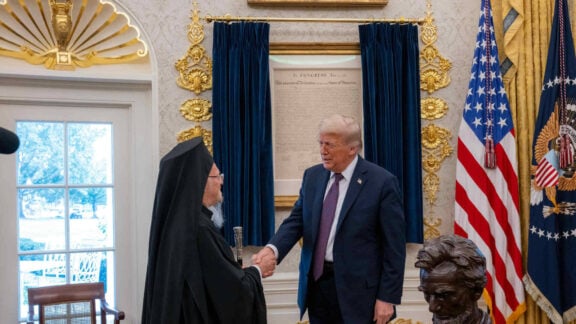What is the document that WikiLeaks published?
It is a leaked transcript of an intercepted teleconference between the top two International Monetary Fund (IMF) officials in charge of managing the Greek debt crisis. In it, Poul Thomsen, head of the IMF’s European Department and Delia Velculescu, the IMF Mission Chief for Greece, appear to discuss a potential Greek default in June, coinciding with the United Kingdom’s referendum on leaving the European Union, that could be used as leverage not only to persuade Greece to proceed with the long-overdue reforms and further implement austerity measures, but also to persuade Germany and the European Union to concede to a debt relief for Greece. According to The New York Times, the leak “exposed the fraught behind-the-scenes political machinations that have led to a deadlock on how to deal with a country still regarded as Europe’s weakest link”.
Why would the IMF go through with that?
The IMF’s involvement in the Greek bailout has been met with much criticism. For non-European IMF creditor countries, the fund’s position on Greece as a violation of its policies elsewhere of not making loans to countries with unsustainable debts. An IMF exit would put the bailout in jeopardy and raise the risk of a Greek default in July, when Athens must repay a large loan. The IMF has leverage in pressing Germany to agree, given that the German Parliament might not agree to release funds to Greece unless the IMF participates in the program. But Wolfgang Schäuble, Germany’s finance minister, sees “no argument” for acceding to the IMF’s demands.
How would they do that?
One of the tactics used by the IMF is stalling; Thomsen and Velculescu are heard strategising to suppress the IMF’s next report on whether Greek debt is sustainable, thus delaying the next stage of the bailout. “In the past there has been only one time when the decision has been made and then that was when [the Greeks] were about to run out of money seriously and to default,” says Thomsen in the leaked document, continuing: “And possibly this is what is going to happen again. In that case, it drags on until July, and clearly the Europeans are not going to have any discussions for a month before the Brexits…” That could pose problems for whether Greece receives financial aid from the bailout in time to meet its July debt repayments.
How did the Greek government react to the leak?
The revelation was met with a combination of fury and incredulity in Greece. The Greek government reacted swiftly, with the Greek PM, Alexis Tsipras, sending a letter to the IMF head, Christine Lagarde, expressing his concerns and asking “whether [Thomsen and Velculescu’s] position reflects the official IMF view”, as well as whether “Greece can trust, and continue negotiating in good faith with, IMF officials who express views such as those expressed in these publications”.
How did the IMF respond to the accusations?
Christine Lagarde wrote a letter of her own, addressed to Alexis Tsipras, which, in a widely symbolic gesture, she made public, uploading it on the IMF website. In it, she dismisses “any speculation that IMF staff would consider using a credit event as a negotiating tactic” as “simply nonsense”, although she does not deny the authenticity of the leaked discussion. She made sure to offer her support to the IMF officials handling the Greek bailout program, stating that “for them to be able to do their work, […] it is critical that your authorities ensure an environment that respects the privacy of their internal discussions and take all necessary steps to guarantee their personal safety”. This phrase is believed to be a thinly veiled accusation towards the Greek goverment as being the source of the leak.
How did things escalate from there?
Alexis Tsipras issued the mandatory response, stating: “The strategy of stalling negotiations, in order to create the circumstances of a credit event in Greece, just before the UK referendum is, indeed, nonsense. It is the kind of nonsense that we all have a duty to avert,” he added. This was after a meeting to discuss the process of negotiations, prior to the next set of talks between his government and the lenders, which took place on Wednesday. Greek Finance Minister, Euclid Tsakalotos was supposed to address the issue, but apparently, the leak was not mentioned at all. It was all business as usual.
Surely, there must have been a debate in Greece about this, no?
There has. Although, in true Greek fashion, the real question – how can the IMF officials entertain the thought of such an event – was not really addressed. The debate mostly focused on whether the Greek National Security Agencies are wiretapping the lenders. Even those who did focus on the content of the leak, dismissed it rather cynically as revealing nothing new, but in fact confirmed what have been the permanent positions of the IMF regarding debt haircut and a reduction of the expected GDP surplus targets.
Did it affect the relationships between the IMF and Germany?
One would expect Germany to be furious for this kind of plotting. However, both sides refrained from engaging in combat. “For us, these talks don’t exist,” stated a spokesperson for the German Finance Minister Wolfgang Schäuble. Lagarde met with the German chancellor, Angela Merkel, on Tuesday, to discuss the negotiations. In a common press conference, they appeared united in their determination to “continue to help” Greece. Both women remained firm in their respective positions. “We are clearly not where we want to be and particularly where Greece should be in order to be stable, in order to be prosperous, in order to respond to the Greek population needs,” said Christine Lagarde, stating that “long-term sustainability, and debt sustainability for Greece is going to matter for private sector investors”. Angela Merkel all but ruled out a debt cut for Greece. “It is not a demand of the federal government to have no debt haircut but rather in our opinion this is legally not possible in the eurozone,” she said, repeating her wish for the IMF to remain on board with the Greek program.
So, where are we now?
However unlikely this might seem, the fallout may have actually helped the Greek bid to wrap up the bailout review by 22 April, which was the government’s wish all along, in order to unfreeze roughly five billion euros in bailout funds and open the way for debt relief talks. During the talks between the lenders and the finance ministry in Athens, both sides agreed that process has been made. One issue on which Athens and the creditors appeared to have agreed Wednesday is that the national pension will be set at €384 after 20 ye`ars of work. As for the relations between Greece and the IMF, they may be strained now, but Christine Lagarde, in an interview with Bloomberg, suggested that she’s willing to let the heat stemming from the weekend exchange dissipate. “We’ve gone through ups and downs,” she said of the talks with Greek officials. “We are there for the people.”
Sources: WikiLeaks, The New York Times, Bloomberg, Kathimerini, ThePressProject.gr






